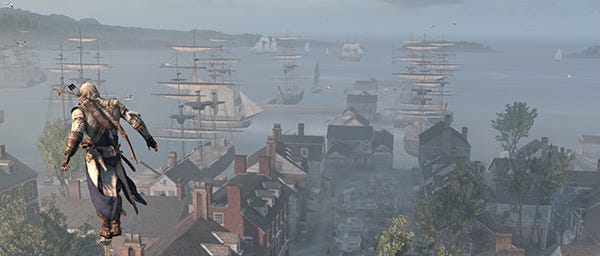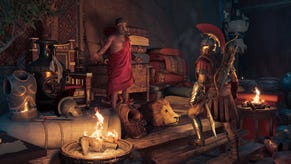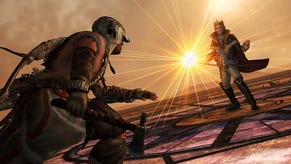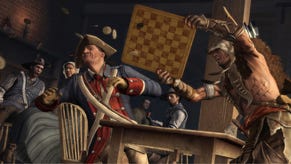Wot I Think: Assassin's Creed III PC
The biggest loser
Assassin's Creed III is the fifth in Ubisoft's open-world action series. Like its predecessors, it has you playing a historical 'assassin' who divides his time between free-running across rooftops, hunting down and killing members of a sinister conspiracy and collecting feathers, with sci-fi diversions into a modern-day tale of one of his descendants trying to prevent an apocalypse. This time, though, we're in the New World - America in the throes of revolution against its British rulers/oppressors. A few weeks after its console version, it's not out on PC - here's what I made of it.
Picture a very fat man.
No, fatter than that. Much fatter.
Now picture him eating a cream cake.
Now picture him following that up with 300 more cream cakes.
Now picture that he has a lactose intolerance that causes temporary but rapid expansion of his guts.
Now picture that he eats 300 more cream cakes.
Now picture that he drinks nine gallons of Coca-Cola, pre-shaken for maximum gassiness.
Now picture that, belching and wheezing at the sheer quantity of food, liquid, bile and phlegm sloshing around inside his obscenely swollen belly, he pulls a dinner jacket onto his bloated, horrible torso.
Now picture that he waddles to the mirror, looks his heavy, sweating, bulging, swollen bulk up and down, and beams with pride.
Assassin's Creed III: lose some goddamn weight. It doesn't look good on you.
What a lot of bloat for no good reason. The policy here is only ever insult the product, not the creators, but God help me that's hard with this one. Having already struggled through on console, it was playing through Assassin's Creed III's preposterously long and self-regarding tutorial/introduction for a second time that took me closest to writing a torrent of invective about the humans who created it. Even now, I quiver with something like hatred as I think about those five hours (two times over - so ten) spent being told what to do, sitting through that steady stream of irony-free exposition, waiting, waiting, waiting to be allowed to play this game on my hard drive - a game I knew full well how to play not only because I'd already played it, but because the vast majority of it is Assassin's Creed II, Assassin's Creed: Brotherhood and Assassin's Creed: No Real Revelations in an attractive and large new setting with a few new toys. Were I to right now be in a room with one, some or all of the team behind this fifth Assassin's Creed, these are the questions I might shout, spittle-flecked, at their bemused faces.
1) Do you understand the difference between fixed-narrative, non-interactive mediums such as movies and games? If yes, do you just not care?
2) Do you truly believe most of your players have never played an Assassin's Creed game before?
3) Are you proud of making millions of people wait around five hours to play the game they purchased?
4) Why did you opt not to give your lead character a personality much beyond 'a bit grumpy', given you were so determined to force him into our faces in so many scenes of drawn-out conversation?
5) Do you truly believe people buy this series for its storyline over and above its free-roaming action?
6) Will you forgive me for shouting at you like this?
Thank God, I am not and very likely will not ever be in a room with one, some or all of the team behind this fifth Assassin's Creed. I suppose I might be should I attend a press tour of a future AC game, but by that point I'd have calmed down and probably forgotten about this. So my questions can go unanswered, but I can feel better for having spoken them, and now I can turn my attentions to the game and the game alone.
There is a decent third-person action game right down in here somewhere, in the same way there has forever been a decent game deep down inside every AC to date, underneath the cheerless sci-fi meta-narrative, the puerile and hollow item collection mini-games and the finding of three hundred and ninenteen thousand different ways to say "go and kill this man" in as long-winded a fashion as possible. But AC3 goes so damn far in its self-indulgence and patronisation that it winds up being the worst game in the series (Revelations wasn't bad on its own terms - trouble was it was a straight-up repetition of the last game). I would take a short, lean game that jettisoned the hours of obnoxious, tedious exposition and the dead weight of new or superficial features in favour of just getting the hell on with being a free-running muderdery guy in nascent America over this swollen, insulting exercise in 100-hour self-indulgence in a heart-beat.
Once the fat game finally - and only temporarily - takes off some of its many overcoats and lets me play it, I have a good time. I run or ride through a beautiful, snow-bound forest, I coo at the evocatively 18th century red brick architecture, I observe the slow shift from English, Scottish, Welsh and Irish culture to the new, hybrid, diverted one of early America, I experiment with the many tools offered with which to trigger and resolve small and/or large-scale combat. To AC3's eternal credit it doesn't often drag me out of its atmospheric and lavish if rather mechanical world to visit the petulant Desmond and his dreary involvement in gaming's current go-to narrative magic bullet, ancestor races. Unfortunately the drip-feed of access to features old and new and the regular interruption by talking bits between largely unengaging characters undoes this improvement. The mid-game move to New York is even more egregious, dangling the enticing prospect of a new setting but immediately plunging the player into punishing new degrees of scripting, linearity and instant-fail conditions before they've had a chance to explore.
Also, the obsession with contriving reasons for lead protagonist Connor to play a critical role in every major event of the American war of independence also adds a lingering smog of absurdity. Yes, the historical research and recreation is a laudable thing for an unashamedly mainstream game to do, but the idea that no-one ever noticed that a surly guy who looks like a wrestler wearing a leather wizard costume was lurking around and splitting skulls with his tomahawk at the Boston Tea Party, the ride of Paul Revere, the battle of Bunker Hill and so forth clashes a dozen heads a second with any attempts at realism and gravitas. That said, it's for that very reason that I don't take any concern that AC3 is jingoistic against the English particularly seriously. It's very silly fantasy, and no kind of political statement whatsoever.
I get that it wants to tell a story rather than be mindless action. I can certainly see the character-bulding intentions behind a prologue that encompasses the adventures of lead protagonist Connor's father in Boston before seguing into Connor's own Native American childhood and long journey to becoming an adult Assassin. That doesn't mean I think it works, or even that it's the right decision. AC3 is, to me, plagued by bad decisions - decisions that regardless of noble intent serve to diminish and dilute a deft open-world action game and its smart new features (i.e. animal-hunting and naval combat).
Connor, meanwhile, is even more of a non-entity than his notoriously dull descendant Desmond. His Native American heritage, fish out of water status in Boston and New York and involvement in a critical moment of history would seem to suggest a fascinating firebrand. Alas, he just glowers and monotones through long hours of being told what to do - forever a dour passenger to someone else's interests. I do feel a certain sympathy for those who have to write Desmond's scenes, as no matter how well-written or performed that character ever was, his inherent status as an interruption upon the player's past-life power trip means he can't help but be irritating. But when the lead character proper winds up such a cold, unsympathetic fish despite his mad adventures and tragic backstory, something much more critical has gone wrong.
Perhaps AC3's war of independence setting requires another Brotherhood to liberate it. There'll be another game next year I'm quite sure, and I'd be very surprised if it changed setting or character given the towering and impressive quantity of world and assets built for this one over the last three years. So I hope it can shear off much of the bloat and just get the hell on with being a party. If Brotherhood was the club remix of AC2, AC3 is its director's cut - as cut by a director badly in need of an editor who can keep him mindful of audience needs and patience rather than auterish pride.
So it's not that this latest AC setup is beyond redemption - far from it, its underlying foundations are strong and proud and its PC version especially is one of the year's finest opitcal treats. Some seven hours in finally I had the run of Boston and the wilds outside it, and at last I wasn't praying for the game to end. I played with the weapons and trapping tools, I marvelled at the size of the city, I liberated areas of it from British oppressors and gained summonable allies (as introduced in Brotherhood) as a tangible reward, and happily ignored the legion of collectormania frippery. I would have been happy with that game, even if it's only a slight departure from the last three: I certainly didn't need all the flab either side of it.
That said, I don't reserve all my barbs for AC3's retrograde and arrogant narrative indulgences. It's at least as much of a disaster zone in terms of mechanics. There's an awful reliance upon (near) instant-fail stealth missions which require tediously tailing an NPC for what feels like an eternity, or its adrenaline-free partner piece slowly walking or horse-riding alongside a friendly character who lacks Connor's fast movement abilities. The 'Assassin' in this series' title has been somewhat oxymoronic since the second game diverted into relatively open action, but here its meaning is entirely abandoned - in terms of action, this is a game about big fights, comparable to a less complex and less satisfying Arkham Asylum. More than that though, it's about following. So much following. Is it that the game is for some reason afraid to let players loose, or is it 'we've built so much and you must therefore be shown it all?' Or is it just a mystifying lack of sympathy for players who want to play?
Underneath and indeed during these dread following marathons, player movement and its long-held problems remains unchanged bar some minor tweaking. Your master Assassin will still regularly hurl himself to a messy death instead of onto the roof or wall you clearly wanted to reach, he will still fruitlessly try to jump vertically up a sheer surface while you're desperately hammering left to go around it, he will still remain stuck squatting on top of a bit a fence while you're trying to pursue someone at speed, and his horse will still find itself mysteriously glued to bits of rock instead of jumping over them.
That so much time, money and effort has clearly been put into AC3's oppressive, cutscene-burdened twin narratives but fundamental issues with the game's fundamental appeal - fluid, free movement in an urban environment - have been left essentially unchanged is a deeper disappointment to me than is all its time-wasting. I wanted this game to make me feel good - powerful, mobile, a near-superhuman athlete with the run of a fascinating environment. Instead, I feel like a hapless prat who's laid low by fences and small walls far more often than he is by an army of redcoats. (A note on PC controls by the way - despite earlier assertions that this version would all but require a gamepad, I've been quite happy with mouse and keyboard. The exception to that is the lockpicking mini-game, which was designed around gamepad rumble motors, but in fairness it's horrible on gamepad too).
Both this and the surfeit of cutscenes are grown from the same root issue - this is an intrinsically mechanical game despite what the open environments would seem to suggest. You can choose, between missions, where to go and what route you take, but there's no real flexibility of combat, choice of behaviour or option to find your own way out of a mistake. You do it the game's way or you fail. Or you stop playing, which would be entirely understandable. I struggle to understand why the game goes to so much effort with its huge environments only to be so prescriptive about how you may interact with them. If it wants to be a linear action game perhaps it should just be one, instead of teasing us with unmet possibilities.
That said, there's all manner of secret or at least unmentioned stuff bubbling away underneath the surface - such as hunting challenges, searches for mythical beasts, collecting pirate booty. A lot of this is uncovered naturally and even accidentally in the course of play rather than being locked inside the slightly tedious rollercoaster of the main game, and it's much more like the organic game of experimentation and discovery that I wanted AC3 to be. Alas, it's incidental and ultimately purposeless, there for Achievements rather than sense of achievement.
The same can be said of the two major new additions, beast-hunting in a sprawling and often snowbound wilderness outside the cities and enjoyably silly-but-fluid (and spectacular) naval battles. These two pursuits are what I most enjoyed doing, but like almost everything else in the game they're there to help fill the many resource metres that are technically about funding an in-game economy and crafting new items (the interface for which is appalling), but realistically are about hollow completism. This is, for all the mountain of features and wonderful semi-open environments, a purely mechanical game - it's about box-ticking, not discovery.
How did it come to this? How did a series founded upon the principles of generous player freedom and sophisticated stealth wind up being arguably more risk-averse than the latest (but infinitely more obnoxious) Call of Duty? By all rights Assassin's Creed, once so confident in throwing out what hadn't worked in favour of a new and vastly improved approach to the same essential concept, should be at the forefront of mainstream gaming right now. Instead, it's put all this work into a largely fantastic new engine (that 'largely' because, while the environments are a treat and half, many of AC3 NPCs have setup a permanent, boggle-eyed, puppet-limbed camp in Uncanny Valley) then squandered it on painstakingly replicating the last three games, problems and all, and indulging someone's movie writing aspirations at the expense of player engagement and freedom. I'm impressed by the game on a technical level, and perhaps a quantity level, but at the same time I'm overwhelmingly disappointed that everything AC3 builds coalesces into something so boring, bloated and shallow.
It's a game that can't see the woods for its own impeccably-rendered trees. I can't quite say I ever loved this series, but I have by and large always liked it. So I truly hope the high sales and breathless reviews from those who are equally complicit in spoon-feeding their audiences won't prevent it from finding its way again.

























